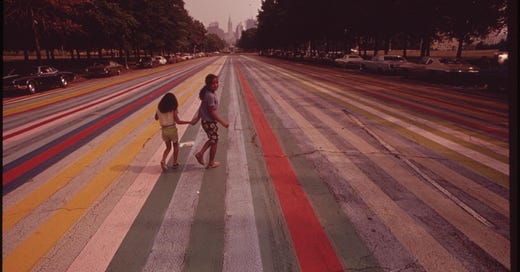Dear Why Bother: Yes, You Should Finish Your Book Even if The World Is Ending
Lit Salon addresses the heartbreak of making art in a time of global boiling & mass destruction + the urgency of possibility & believing in it again + how doing the next right thing keeps us afloat
This week’s Lit Salon question moves me deeply. “Why Bother?” asks about the role and meaning of making art in an era of global boiling, about the worth of creating in the midst of what feels like mass destruction.
Considering the news this week—the horrific and heartbreaking Maui wildfires, Florida’s dying reefs, the climate-fueled decimation of U.S. orange crops … it’s easy to understand how “Why Bother?” could feel demoralized and defeated. Why any of us could feel demoralized and defeated.
Why bother, indeed?
I can’t make any claim to the answer, let alone the truth, of why we should bother to create through a time of destruction, but I do have some passionate thoughts on the matter. Before I share those concretely … I offer you a glimpse into the cedar chest of my past, that musty archive of experience that shaped and still shapes me, that permanently undergirds the way I experience the world, and my own art-making within it.
When I was a little girl, my mom would send me to live in the basement as punishment. The rules of basement living were simple: go down after school, stay there until the next morning, leave the basement in time to catch the bus to school, and, after school, go back down again and stay quiet until morning, even if you saw spiders or mice. Mom called this punishment being “kicked out of the family,” and that’s just how it felt.
For a long time, I didn’t know that my friends didn’t get sent to live in their basements. I also didn’t know how to predict which actions of mine would get me sent to the basement and which wouldn’t. Sometimes, I got banished for failing to do my chores (I was responsible for vacuuming, dusting, dishwashing, bathroom cleaning, and various outdoor tasks like watering, pulling tumbleweeds, and picking up dog poop). Other times, though, I got sent down for my attitude, which Mom could clearly identify by “the look on my face.”
What I know now, but didn’t understand when I was little, is that my basement stints weren’t triggered by things I did. They were triggered by Mom’s moods. It was out of my control.
Sometimes, a wave of sadness and outrage swells in me when I remember those nights alone underground—the concrete, the damp, the dark. More often, though, I feel something else. Something complicated and personal, like a signature perfume crafted solely for me, with notes of sage and pepper and free Wyoming air, plus a hint of fearful sweat and metal and must, tinged with burnt cotton from the time I tried to cover the bare bulb down there with a dish cloth, and, finally, the slow smolder of woodsmoke from live embers on a rocky lakeshore to remind me of who I am and how that essential self remains alive, unscathed, potent, hungry, and making art.
This is why I know art can protect and nourish the essential self through despair. Here’s how I think that works—not just for me, but for all of us.
What doesn’t kill doesn’t always make you stronger. Sometimes it just leaves you scarred and broken, a lesser version of yourself. This is a fundamental truth. But … there is a but. Depending on a complicated array of biology and circumstance, we may emerge from pain or trauma with—in addition to the scars!—certain gifts.
My childhood made a writer out of me, gave me a relationship with language that became a lifeline. Words became my boat, my fort, my little shaft of sunlight in the forest. My bridge, my footpath, my parachute. Words became a portal to a vivid future I clung to with all my might, a future that gleamed and shone on the horizon of what I foresaw as my own adulthood—my emancipation. Seeing the keyhole of possibility changed everything.
It still does.
Today’s Lit Salon takes a close look through that keyhole, and the tremendous power streaming through it.







